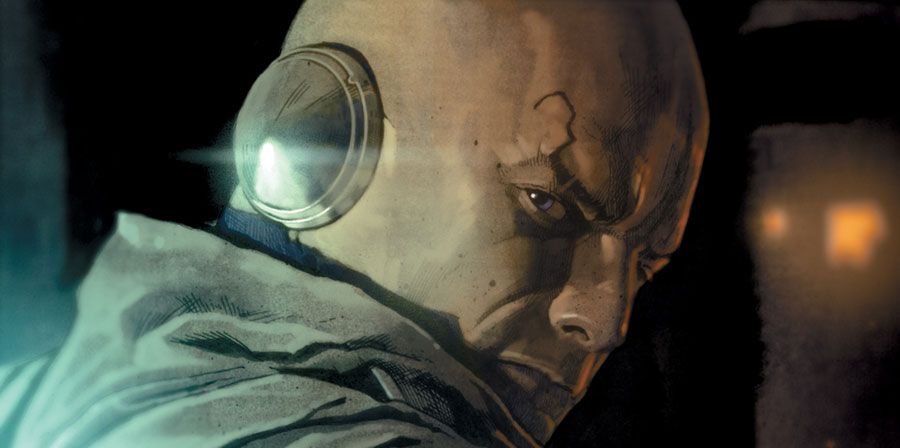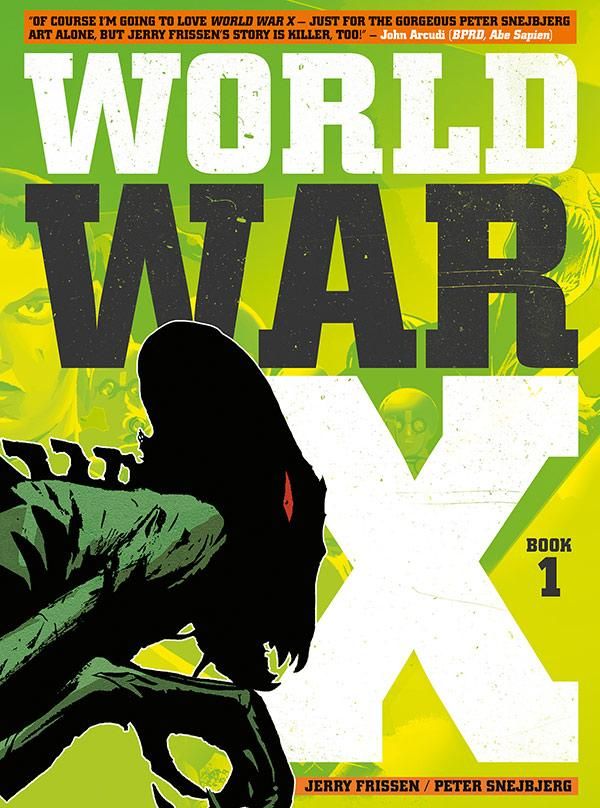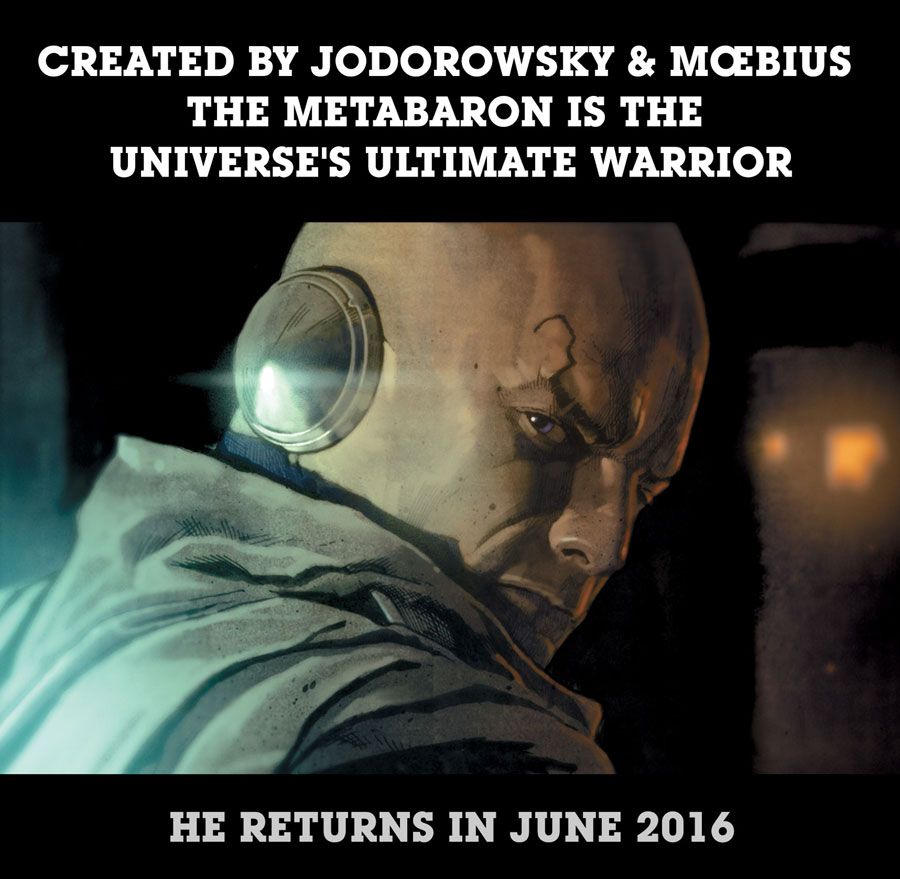Humanoids' plans for the return of The Metabaron clearly takes a great deal of advanced work, given that while the new stories were announced in October 2014, the first volume/cycle (of four) will not hit shelves until June 2016. Embarking on what happened to No Name (since the end of the 1990s Metabaron spinoff series by Alexandro Jodorowsky and Juan Gimenez), in this new interview, Metabaron writer Jerry Frissen shares his anticipation for tackling an adventure based on a Jodorowsky plot.
Frissen is known for writing a wide variety of stories, so while we had the opportunity, this discussion also addressed the upcoming World War X (his collaboration with Peter Snejbjerg set for release this April) as well as lessons learned from artist Guy Davis on Zombies That Ate The World.
Tim O'Shea: How did you end up collaborating with industry veteran Peter Snejbjerg on World War X?
Jerry Frissen: I knew about his work for quite some time and I always wanted to work with him. When I was writing the first draft of the script, I thought it would be cool to ask him to work with me. Since my publisher liked his work too, I sent Peter an email and he accepted immediately. Everything was set up in a few days. He’s easy going and I was very impressed with his take on WWX. He found a unique way to make the monsters believable. For book one, I was hiding them as much as possible, a little bit like Ridley Scott did with Alien, because I thought it was the only way to make them scary but Peter had an opposite idea, he wanted to show them immediately. When I saw the first three pages, I knew I was wrong. We have another project together, but working on The Metabarons is so overwhelming that it needed to be pushed back.
What is it about the alien-apocalypse horror genre that appeals to your narrative sensibilities?
I don't know exactly. In the case of WWX, it was more about the notion that something happened on earth way before humans. Billions of years later, they now have to deal with it. I don't know why I like this idea so much, I used a similar one in another project. I see the past as I see the future, as scifi. Recently I did two books set in the middle age and to my point of view, it was like talking about an alien civilization.
There are very few writers that can say they have worked with a talent as unique as artist Guy Davis. What did you most enjoy about working with him on Zombies That Ate The World? Looking back at it, are there certain storytelling lessons you learned from Davis?
Since he was the first artist I worked with, I leaned a lot from him. Mainly that I didn’t need to restrain myself with what I had in mind. Guy can draw anything with as much rage and power that you can find in a punk band. I remember asking him if there was anything I shouldn’t put in my script, something that he wouldn’t want to draw because it would be too difficult. He basically told me that I could do whatever I wanted. Working with Guy was a privilege. He’s also a great human being. I love him.
Much of your work is first published in French, then often an English version is released. This question partially comes from a place of ignorance (as I do not speak French), but are there nuances of French dialogue in a comedy series like Lucha Libre that have to be tweaked to carry the same humorous punch when translated to English. Or is that a non-issue, given that much of comedy can be conveyed in the art?
It’s a non-issue because I've lived in both cultures. I was born in Brussels where I spent my youth and now I live in Los Angeles. So when I’m working, I always keep in mind that everything needs to be understood as well by French speakers or English speakers. Of course sometimes, there’s something I write that’s more a reference to one or the other but it is pretty rare.
What interested you most about tackling The Metabarons and are you intimidated at all tackling a story initially conceived by Alejandro Jodorowsky?
I never thought about working on something like that before I was offered to do so. It happened in a very weird way. I had a lunch with Fabrice Giger, CEO of Humanoids and during the conversation he told me that he couldn’t find any writer to work on, The Metabarons, I said –as a joke– “OK, I’ll do it.” He called me the next day saying that he spoke with the editors in Paris and they wanted me to do it. I was really surprised. I was very exited for at least an hour, and then I freaked out wondering what I was going to do. I read the complete first cycle twice putting on paper what I liked and what I would like to write about. The real challenge is the size of Jodorowsky’s imagination. Not only he’s talking about an entire family that goes on multiple generations but also about the universe. Not a planet, not a solar system, not a galaxy but the entire universe… I was not intimidated because I guess I’m too old to be intimidated, but I knew one thing for sure: I’m not Jodorowsky and I’ll never be Jodorowsky. So I decided to just be myself. I’m a sci-fi guy, I like Heinlein, Clarcke, Farmer, Simak, etc. So my take on The Metabarons will be a little bit less fantasy and way more sci-fi.
Can you give us a glimpse of what factors influenced the decision to have you team with artist Valentin Sécher for one story cycle, and artist Niko Henrichon for the second cycle?
There are a lot of names that circulate between all the people at Humanoids. Usually the editor contacts them when everybody agrees. In the case of Valentin, it was obvious that he was born to do it. When he got the call, I’m pretty sure he felt like the mother ship called him back home! What he did so far is beyond amazing. He’s pushing every limit.
I was happy that someone suggested Niko because I thought of him for WWX. I love his work. He’s less realistic than Valentin but his art is as dramatic as Juan Gimenez.



